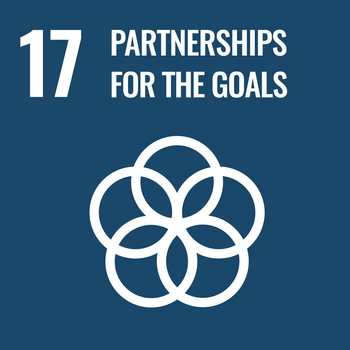Partnerships for the SDGs
“Leave no one behind”, the motto of the United Nations’ 2030 Agenda for Sustainable Development, sums up the humanitarian basis of the vision of a world without extreme poverty and exclusion. If we are to reach this ambitious goal by 2030, there has to be effective international cooperation, especially in the field of development. And this requires people who make such international cooperation happen.
For the German development service agencies, partnerships are the essential basis for turning the sustainable development goals laid down in the Agenda 2030 action plan1 into practical reality. All the 17 goals are important and they are all interrelated. Goal 17, “Partnerships for the Goals”, makes it clear that effective cooperation is essential for the implementation of the Agenda. This necessarily entails forging and financing alliances, establishing policy coherence, and strengthening institutional support.
For more than five decades, the development service agencies have been committed, together with their partners, to working for social justice, promoting democracy and peace, improving the living conditions of disadvantaged people, and promoting sustainability. The agencies have gained from this experience and are therefore well-placed to implement development policies most effectively. The development service agencies share the understanding, laid down in Agenda 2030, that every country in the world has to play a part in making the necessary transition to a sustainable economic and social system, and that such development has to take place in the global North as well as in the global South. The agencies already came to this realisation before the Agenda was agreed by the United Nations.
Development service is a concrete expression of solidarity for a limited period of time. Professional development workers with substantial work experience apply their knowledge and experience in situations where there is a need for joint action, both to develop strategies for change and to realise their implementation. The German Development Workers Act2 which came into force in 1969, established the necessary framework for the provision of social security for professional development workers. The development service agencies are convinced that it is possible, through direct encounter and face-to-face discussion, for individuals to understand other perspectives and contexts and to develop future-oriented solutions together. Partnerships are therefore essential, not only for learning together and for the intercultural exchange of experiences, but also for the effective and sustainable implementation of joint projects and measures.
According to the Agenda 2030, responsibility lies first and foremost with governments. But successful implementation depends to a very great extent on the participation of everyone – businesses as well as individuals. And there has to be a strong civil society too. Civil society calls for strict environmental and social standards, insists on respect for human rights, and engages in advocacy on behalf of oppressed people and minorities.
This is especially difficult and important where there is civil war and in crisis regions, where the legitimacy of institutions is being put to the test and there is shrinking space for action. Where democratic structures are lacking, in repressive states, and in systems of exploitation and marginalisation, special support has to be given to the creation of fair and democratic alternatives and to the actors who are promoting such alternatives locally. In such situations, partnerships between groups within civil society can be a source of mutual strength and protection. And, as the experience of development service agencies shows, these partnerships prove their worth in times of great need.
Partnerships are living “organisms” and need to be continually and regularly restructured. Our own understanding - and that of our partners - of lived solidarity, development, and global interconnections has changed dramatically over the decades. So development service is also to be seen as a learning experience, a learning experience in which the exchange of knowledge and experience is crucial, and a learning experience which is itself fruitful. It has therefore been possible, over the course of several decades, to succeed in creating a large network of people, organisations, and structures, who are now working, each in their own way, on the implementation of the SDGs.
Every individual’s commitment begins with the understanding that they carry a share of responsibility. Professional development workers and professionals in civil peace service have come to this understanding. They each bring their specialist knowledge and commit a couple of years of their life to helping to improve the living conditions and capacity for action of people who live under more difficult circumstances than they do themselves. When they have completed their service, they return with experiences which are valuable for the implementation of the SDGs in Germany and Europe. In this sense, their commitment has not ended, but changed, with the completion of their development service. The global challenges and the SDGs are truly global and therefore apply to us as well.
More than one thousand professional development workers are currently serving in 90 countries. Some are working in new structures and others in partnerships which have grown and developed over many years. Building such partnerships - in the workplace, in a town or parish, and at regional and international levels - and building alliances and networks will remain a key task of development service. The principles of participation and sharing are a common thread throughout. In this way, development service is continuously leading to the further discovery of knowledge which is based on experience, knowledge which is important for the implementation of Agenda 2030 and SDG 17 in particular.
We are the first generation to be able to end poverty, and the last generation that can take steps to avoid the worst impacts of climate change.
UN Secretary-General from 2007 to 2016
1The various dimensions of sustainability (ecological, economic, and socio-cultural), human dignity, sustainable peace, global justice, partnership, and solidarity are all anchored in the five basic principles of joint action.
Statement issued by:
Association of German Development Services (AGdD)
Meckenheimer Allee 67-69, 53115 Bonn, Germany
info[at]agdd.de

